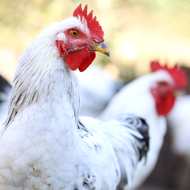Halal labelling will not improve welfare, says BVA

BVA is calling for products to be labelled "stunned" or "non-stunned".
BVA has spoken out against the labelling of meat products as halal or kosher, saying this will do nothing for animal welfare and could even fuel prejudice.
MPs yesterday rejected an amend to the Consumer Rights Bill, which would make it compulsory for halal and kosher food to be labelled.
Robin Hargreaves, BVA president, has written to David Cameron, Nick Clegg and Ed Milliband, saying the labelling of products as halal or kosher will not help inform consumers about welfare concerns.
"Halal labelling does not recognise that around 88 per cent of halal slaughter in the UK is pre-stunned," he explains.
BVA has long campaigned for an end to animal slaughter without pre-stunning. While the practice is allowed by law, the organisation wants food products to be labelled as "stunned" or "non-stunned".
A Government e-petition launched by BVA reached more than 50,000 signatures in just two weeks.
Mr Hargreaves has concerns that calls to label meat products with information about welfare at slaughter could be "hijacked by prejudice".
Recent media coverage has prompted a strong reaction from the general public. Mr Hargreaves says the amount of confusion that remains about slaughter methods is "very disappointing".
The issue hit the headlines when national newspapers reported that a number of leading supermarket chains sell halal meat products without labelling them.
In his letter to party leaders, Mr Hargraves explained: "Unfortunately some of the recent media attention risks this important animal welfare issue being hijacked by people and groups with other agendas.
"We have always made it very clear that we are not concerned with the practising of religious belief, but with the throat cutting of animals that have not been rendered insensible to pain."
Mr Hargreaves urged the Government to compel the food industry to label all meat as "stunned" or "non-stunned".



 The latest
The latest